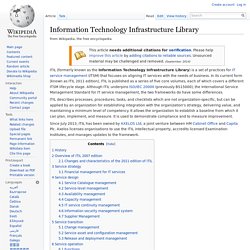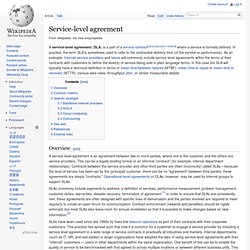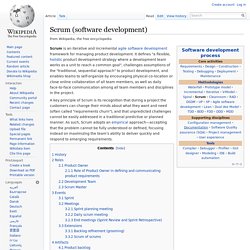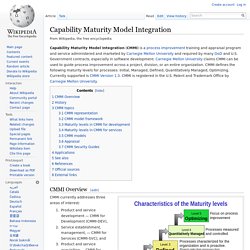

Information Technology Infrastructure Library. ITIL (formerly known as the Information Technology Infrastructure Library) is a set of practices for IT service management (ITSM) that focuses on aligning IT services with the needs of business.

In its current form (known as ITIL 2011 edition), ITIL is published as a series of five core volumes, each of which covers a different ITSM lifecycle stage. Although ITIL underpins ISO/IEC 20000 (previously BS15000), the International Service Management Standard for IT service management, the two frameworks do have some differences. ITIL describes processes, procedures, tasks, and checklists which are not organization-specific, but can be applied by an organization for establishing integration with the organization's strategy, delivering value, and maintaining a minimum level of competency. It allows the organization to establish a baseline from which it can plan, implement, and measure. It is used to demonstrate compliance and to measure improvement.
History[edit] The Five Volumes : Service-level agreement. A service-level agreement (SLA) is a part of a service contract[disambiguation needed] where a service is formally defined.

In practice, the term SLA is sometimes used to refer to the contracted delivery time (of the service or performance). As an example, Internet service providers and telcos will commonly include service level agreements within the terms of their contracts with customers to define the level(s) of service being sold in plain language terms. In this case the SLA will typically have a technical definition in terms of mean time between failures (MTBF), mean time to repair or mean time to recovery (MTTR); various data rates; throughput; jitter; or similar measurable details.
Overview[edit] A service-level agreement is an agreement between two or more parties, where one is the customer and the others are service providers. SLAs have been used since late 1980s by fixed line telecom operators as part of their contracts with their corporate customers. Common metrics[edit] Scrum (development) Scrum is an iterative and incremental agile software development framework for managing product development.

It defines "a flexible, holistic product development strategy where a development team works as a unit to reach a common goal", challenges assumptions of the "traditional, sequential approach" to product development, and enables teams to self-organize by encouraging physical co-location or close online collaboration of all team members, as well as daily face-to-face communication among all team members and disciplines in the project.
A key principle of Scrum is its recognition that during a project the customers can change their minds about what they want and need (often called "requirements churn"), and that unpredicted challenges cannot be easily addressed in a traditional predictive or planned manner. Later, Schwaber with others founded the Scrum Alliance and created the Certified Scrum Master programs and its derivatives. Each sprint is started by a planning meeting. Help Desk Software by SysAid. Capability Maturity Model Integration. Capability Maturity Model Integration (CMMI) is a process improvement training and appraisal program and service administered and marketed by Carnegie Mellon University and required by many DOD and U.S.

Government contracts, especially software development. Carnegie Mellon University claims CMMI can be used to guide process improvement across a project, division, or an entire organization. Under the CMMI methodology, processes are rated according to their maturity levels, which are defined as: Initial, Repeatable, Defined, Quantitatively Managed, Optimizing. Currently supported is CMMI Version 1.3. CMMI is registered in the U.S. Overview[edit] Characteristics of the Maturity levels.[1] CMMI currently addresses three areas of interest: Product and service development — CMMI for Development (CMMI-DEV),Service establishment, management, — CMMI for Services (CMMI-SVC), andProduct and service acquisition — CMMI for Acquisition (CMMI-ACQ).
History[edit] CMMI topics[edit] CMMI representation[edit]